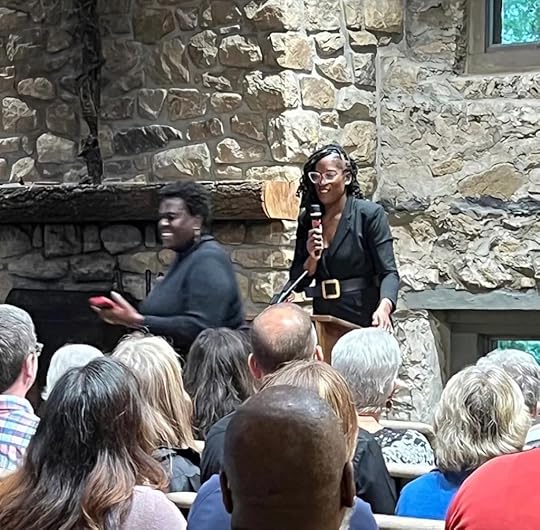Listen to Your Mother HoCo: Unfinished
This Mother’s Day weekend, I had the honor of co-hosting Listen to Your Mother, an event showcasing 10 incredible women storytellers as they shared honest, heartfelt, and powerful stories of motherhood. Topics ranges from infertility, to getting dating advice from your college aged kid, to parenting with mental illness, to generational sweet potato pie mishaps.
It was a sold out event!
Proceeds from our event benefitted JustLiving Advocacy Inc. an organization supporting women who lead single parent households.
Below is the piece I read for the event.
Unfinished
Last year, for Thanksgiving, we all got sick.
It started with my middle son, made its way to my youngest, launched a sneak attack on my husband and oldest, and then finally – it got me.
Not one to be defeated, I still committed to cooking a big dinner. A little secret about me: I am prone to mom-guilt so the thought of my sick family sitting around a pizza box made me feel all kinds of bad.
Our family menu is a combination of tricks I learned, adapted, and made up:
Mac and cheese from Patti Labelle’s cookbook with a dash of Grey Poupon courtesy of my fancy Aunt Irene, A couscous and raisin salad recipe I created based on a tasty dish I had when traveling to Senegal in college; The most tender Butterball Turkey ever, made slathered in Country Crock and stuffed with cornbread stuffing with hearty bits of green peppers and onions that make my mouth water just thinking about it.And then the pies.
Store-bought apple pie, always with homemade whipped cream, and my grandmother’s famous sweet potato pies, which conjure up as much flavor as they do emotions.
You see, my grandmother died when my mother was 19 years old (and her sisters were only 16 and 21), over a decade before my mother she had me. The recipe started with my grandmother, but it’s held together in the unreliable memory of the teenage girls she left behind. It’s always a variation of very right, but also very wrong.
Here is what was handed to me:
Boil three sweet potatoes until they are tender, about two hours (very wrong)Beat the potatoes smooth with one stick of butter and two eggs until you get all the strings out, usually 30 minutes (sort of wrong)Season with 1 cup of sugar and ½ teaspoon of vanilla, and add cinnamon, allspice, and nutmeg to taste (soooo right)Enlist one lucky child to lick the spoon for a final taste (questionable, but will not dispute)And then pour the pies into two defrosted deep dish shells and bake until the ancestors whisper “It’s time” (right-ish with a ton of room for error).Inevitably, the process would be long, no blood, but definitely sweat – and one year… tears.
When the pies were cooled, usually under a paper towel on the kitchen table (probably wrong), we’d dig in. A fresh-cut piece would inevitably spill out of the crust onto the plate – not undercooked, just… soft. The aunts would frown, but us kids never cared. The taste reigned supreme.
Years ago, I came across a New York Times sweet potato pie recipe that blew away what I knew.
Turns out, sweet potatoes didn’t need nearly as long to get tender, and if you remove the parts of the potato near the skin, no strings!
This seemingly benign knowledge hit me deep. It wasn’t that I doubted my grandmother’s cooking legend, I just suddenly realized how unfinished her mothering had been in the three young girls she left behind.
That realization was a slow burn at first. The victory of taking that first perfectly firm and sweet pie out of the oven should be bottled up and sold. And if there’s a heaven, I’d like to think my grandmother yelled out: FINALLY!
Because it was funny too, right? The years of sweet potato pie mishaps, the misshapen pies, and the self-imposed arduous pie-making labor.
But it was also frustrating.
If only someone had written it down. If only they had asked more questions. If only someone had looked it up sooner. We would have saved all the wasted time. We could have made more pies. We could have done her proud.
Now, nearing 43, the same age my grandmother was when she died, and with three children of my own – two of whom are nearing adulthood – it fills me with profound sadness. If I died tomorrow, how much would I leave unfinished? What would be the fragments of me they’d struggle to remember? What parts would they hold? What parts would they forget?
I see in the faces of my boys, her girls and I know she must have gone kicking and screaming.
Sometimes the unfairness of this loss hits me like a jab to the jaw.
Is this deferred grief?
Mourning the “it” that remains unfinished? Unfinished pie recipes? Unfinished mothering? Unfinished love? Unfinished me.
Not too long ago, I saw and shared a photo on social media.
It was a nested image that depicted a fetus inside a womb, and in that fetus, you could see another fetus, and in that fetus, another. The caption read that as women, we’ve been carried by generations before us. So, because my grandmother carried my mother, and at some point in the womb, my mother developed all the eggs she’d ever produce, my grandmother had once carried a part of me.
Wild.
I found so much comfort at the thought of being part of her – that our connection went beyond what remains unfinished.
We are in and of one another in a way that goes beyond explanation. Beyond what is complete.
My mother says I have my grandmother’s long, smooth legs. My cousin, Shavonne has her whole face. We all carry her pride, moxie, and strength.
It’s hard to say all we missed from losing her. Nothing will ever make that okay.
However, to honor her, we embrace the bitter and the incredibly sweet. We find grace in imperfection. And where we can, as with a well-made pie, we finish the unfinished.




